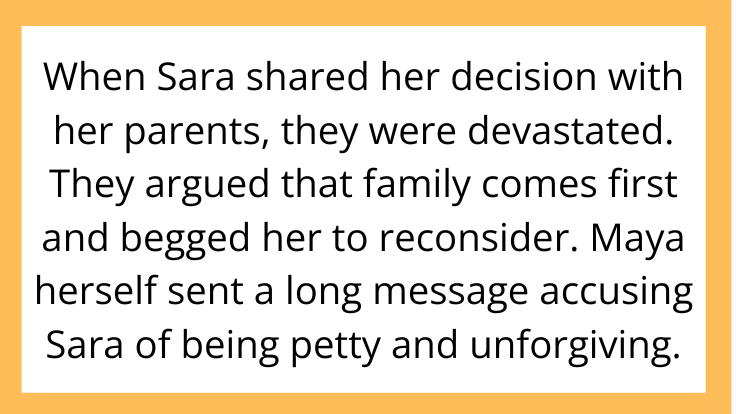AITAH for Not Inviting My Sister to My Wedding After She Tried to Ruin My Engagement?
When it comes to weddings, family drama often feels inevitable—but what happens when the conflict cuts so deep that you decide not to invite your own sibling to the big day? In today’s AITAH scenario, we explore a real-life story that’s sparked heated debate online: Is it heartless to exclude your sister from your wedding if she tried to sabotage your relationship?
Let’s unpack this complex situation step by step.
The Background: A Sibling Betrayal

A 27-year-old bride-to-be—let’s call her Sara—shared her story on r/AITAH. For years, Sara and her older sister, Maya, 31, had a tense relationship. Maya often criticized Sara’s choices, from her career to her friendships. But things escalated dramatically when Sara got engaged to her fiancé, Daniel.
According to Sara’s post, Maya told multiple family members that Daniel was “using” Sara and even contacted Daniel’s ex-girlfriend to dig for dirt. She implied she had proof of his “cheating,” but when pressed, she admitted she was only speculating.
Despite the fallout, Sara tried to keep the peace during family gatherings. But as the wedding approached, she made a decision: Maya would not be invited.
Drawing the Line: No Invitation, No Apologies

Sara explained that her decision wasn’t impulsive. She felt that Maya had crossed a line by actively trying to ruin her engagement. She also worried that inviting Maya to the wedding could lead to more drama—maybe even a public confrontation.
“I want my wedding day to be about joy,” Sara wrote. “I can’t spend the day worrying about whether my sister will try to humiliate me.”
When Sara shared her decision with her parents, they were devastated. They argued that family comes first and begged her to reconsider. Maya herself sent a long message accusing Sara of being petty and unforgiving.
Sara turned to Reddit to ask: Am I the villain for not inviting my sister to my wedding after everything she did?
Loyalty vs. Self-Preservation

Sara’s Perspective: Protecting Her Happiness
Many commenters immediately empathized with Sara. They pointed out that Maya hadn’t simply voiced concern—she’d gone out of her way to interfere with the relationship, spread rumors, and create mistrust. For Sara, excluding Maya wasn’t about revenge; it was about protecting her mental health and ensuring her wedding day wasn’t overshadowed by negativity.
As one top comment put it: “Just because someone is family doesn’t mean they get unlimited chances to hurt you.”
Maya’s Perspective: Regret and Reconciliation
On the other hand, some argued that Maya’s behavior, while hurtful, came from a place of misguided protectiveness. Maybe she truly believed Daniel was bad news, and her methods, though extreme, were meant to shield her sister.
Others felt that completely shutting Maya out of the wedding might make reconciliation impossible, fracturing the family for years.
Reddit’s Verdict: Not the Villain

The overwhelming consensus was clear: Sara was not the villain. Most agreed that actions have consequences, and Maya’s decision to undermine the relationship had led to this outcome.
“You don’t owe her a front-row seat to your happiness after she tried to destroy it,” one commenter wrote.
However, a few voices warned that the long-term damage to family dynamics could be significant, and urged Sara to consider a mediated conversation or limited contact before making her final decision.
When to Draw the Line with Family

Weddings Are About You—Not Family Expectations
Weddings often become the stage for family expectations and unresolved conflicts to play out. But ultimately, your wedding is your day. You get to decide who is there to support you.
Excluding a family member is a painful choice, but it doesn’t automatically make you selfish. Sometimes, setting a firm boundary is the healthiest option.
Consider Future Reconciliation
While it’s important to protect your peace, it’s also worth reflecting on what you want long-term. Is there any path to rebuilding trust with Maya? Would you regret not leaving the door open for reconciliation?
Some couples choose to invite a difficult family member but establish clear boundaries: no drama, no speeches, no interference. Others, like Sara, feel that any presence at all is too disruptive.
How to Navigate Family Conflict Before a Wedding

If you’re in a similar situation, consider these steps:
-
Communicate Directly: If possible, have a candid conversation about why you’re making this decision.
-
Establish Boundaries: Make it clear what behaviors are unacceptable and why.
-
Offer a Path Forward: If you’re open to reconciliation in the future, say so.
-
Get Support: Lean on your partner, trusted friends, or a therapist to process the emotions.



